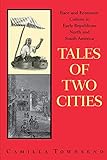Tales of Two Cities : Race and Economic Culture in Early Republican North and South America / Camilla Townsend.
Material type: TextPublisher: Austin : University of Texas Press, [2021]Copyright date: ©2000Description: 1 online resource (344 p.)Content type:
TextPublisher: Austin : University of Texas Press, [2021]Copyright date: ©2000Description: 1 online resource (344 p.)Content type: - 9780292798816
- 305.5/09752/6 21
- HN320.Z9 S67 2000eb
- online - DeGruyter
| Item type | Current library | Call number | URL | Status | Notes | Barcode | |
|---|---|---|---|---|---|---|---|
 eBook
eBook
|
Biblioteca "Angelicum" Pont. Univ. S.Tommaso d'Aquino Nuvola online | online - DeGruyter (Browse shelf(Opens below)) | Online access | Not for loan (Accesso limitato) | Accesso per gli utenti autorizzati / Access for authorized users | (dgr)9780292798816 |
Frontmatter -- CONTENTS -- List of Maps and Tables -- Acknowledgments -- Prologue: First Impressions -- Introduction -- Part I -- 1. In the Streets of the Cities -- 2. Conquest and Colony -- Part II -- 3. A Merry Party and Serious Business -- 4. Strawberry Parties and Habits of Industry -- Part III -- 5. The Quest of the ‘‘Personas Decentes’’ -- 6. The Quest of the Contributing Citizens -- Part IV -- 7. Working on Dead Man’s Rock -- 8. ‘‘To Become the Unfortunate Tenants of Your Alms House’’ -- Conclusion -- Notes -- Bibliography -- Index
restricted access online access with authorization star
http://purl.org/coar/access_right/c_16ec
With a common heritage as former colonies of Europe, why did the United States so outstrip Latin America in terms of economic development in the nineteenth century? In this innovative study, Camilla Townsend challenges the traditional view that North Americans succeeded because of better attitudes toward work—the Protestant work ethic—and argues instead that they prospered because of differences in attitudes towards workers that evolved in the colonial era. Townsend builds her study around workers' lives in two very similar port cities in the 1820s and 1830s. Through the eyes of the young Frederick Douglass in Baltimore, Maryland, and an Indian woman named Ana Yagual in Guayaquil, Ecuador, she shows how differing attitudes towards race and class in North and South America affected local ways of doing business. This empirical research significantly clarifies the relationship between economic culture and racial identity and its long-term effects.
Mode of access: Internet via World Wide Web.
In English.
Description based on online resource; title from PDF title page (publisher's Web site, viewed 26. Apr 2022)


